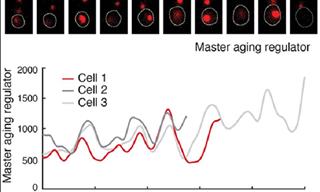As we age, our cells gradually deteriorate, causing a decline in our physical abilities over time. However, scientists have made an exciting breakthrough in the field of longevity research by using a synthetic genetic 'clock' to extend cell lifespan.

The researchers at the University of California, San Diego, used a type of yeast called Saccharomyces cerevisiae as a model for the aging of human cells. By utilizing microfluidics and time-lapse microscopy, researchers were able to observe and record the changes that occur during the aging process in cells throughout their lifespan.
By altering the genetic makeup of the yeast cells, the team managed to increase their lifespan by a remarkable 82 percent on average. This development is a significant step towards controlling cellular aging and treating age-related conditions.
Related: 7 Invaluable Secrets to Ensure Your Longevity
Altering the gene circuits
The key to this breakthrough lies in editing the genetic circuits that regulate cellular processes, thereby reducing wear and tear on the cells. Once scientists have a better understanding of how these circuits work, they can begin to modify them to improve cellular longevity. This could have a major impact on our overall health as we age.
"These gene circuits can operate like our home electric circuits that control devices like appliances and automobiles," says molecular biologist Nan Hao, from the University of California San Diego.
The scientists began by utilizing computer simulations to unravel the intricate workings of the cell aging process. They discovered that the circuit oscillates between two different aging states, similar to the way brakes and tires on a car both experience wear and tear as they age.
Afterward, they attempted to alter this circuit by introducing a modification that would cause the cells to oscillate between the two aging states, rather than sticking to one or the other. This indecisiveness resulted in a slower aging process compared to regular yeast cells.
The aging clock
Imagine slowing down the ticking of a clock to extend its lifespan - this is akin to what was achieved in the engineered cells in this study. While the aging process wasn't halted entirely, it was significantly decelerated, resulting in the engineered cells living longer than the untreated cells used as controls. Interestingly, the engineered cells displayed greater consistency in their lifespan compared to the untreated cells. Hao notes that the engineered oscillator cells have outlived any other strains previously discovered through unbiased genetic screenings.

The oscillated cells swung between aging states. (Hao Lab, UC San Diego)
The research team also discovered that the synthetic genetic circuit within yeast cells not only maintained their vitality during the study but also displayed faster growth and division. The encouraging result of this investigation implies that the circuit could have a positive effect on the health of various types of cells. This is supported by the fact that yeast cells, which are similar to human cells that are widely used in research, were employed in the study. Further testing is required to determine whether this remarkable longevity boost will extend to other cell types.
Manipulating genetic codes within cells, as demonstrated in this study, involves intricate and precise techniques that are continuously evolving. This innovative method has a multitude of potential applications, such as enhancing crop durability to withstand harsh environmental conditions.
Related: Here Are Some Novel Ways of Delaying Aging...
This unprecedented breakthrough, as per Hao, is the first instance where engineering principles and computational guidance were utilized to systematically restructure gene circuits and manipulate the aging process, resulting in an extraordinary enhancement of longevity.
The research has been published in Science.
 Go to BabaMail
Go to BabaMail
























